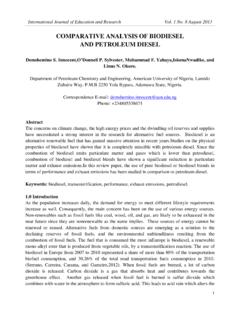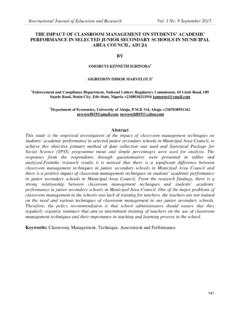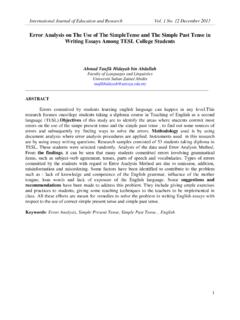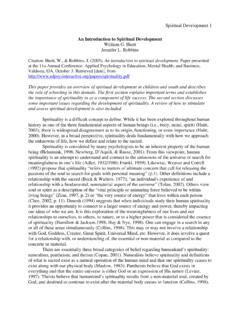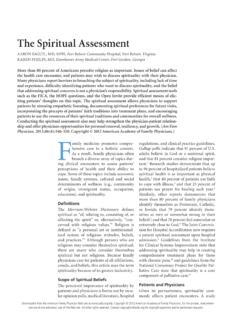Transcription of INFLUENCE OF RELIGIOUS BELIEFS ON HEALTHCARE PRACTICE
1 International Journal of Education and Research Vol. 2 No. 4 April 2014 37 INFLUENCE OF RELIGIOUS BELIEFS ON HEALTHCARE PRACTICE Akpenpuun Joyce Rumun Faculty of Social Sciences, Benue State University, Makurdi, Benue State, Nigeria E-Mail: ABSTRACT The perceived role of God in illness and recovery is a primary INFLUENCE upon the health care BELIEFS and behaviours of people. The RELIGIOUS BELIEFS of the people result in many health care BELIEFS and practices which are significantly different based on the persons religion . Only by understanding the RELIGIOUS BELIEFS of individuals can medical practitioners effectively meet the health care needs of patients of diverse RELIGIOUS BELIEFS .
2 This paper seeks to discuss the various religions that people affiliate with and the BELIEFS and practices of such religions towards various health issues. This will enhance the knowledge of the society in general and the medical practitioners in understanding how religion and spirituality are felt, lived, and experienced by the people. This would help professionals release the old stereotypes and prejudices that they have about certain RELIGIOUS BELIEFS and practices. The RELIGIOUS freedom of the patients would not be infringed upon before, during and after treatment. KEYWORDS: BELIEFS , HEALTHCARE , PRACTICE , religion , spirituality , Healing INTRODUCTION The purpose of this article is to consider the relationship between religion and HEALTHCARE in order to suggest how physicians and other health care providers should respond when the faith-based preference of a patient clashes with the medically indicated treatment modalities.
3 The patient and practitioner really need to understand each other's vantage point. In a nutshell, the patient knows that the doctor certainly intends what is best but the patient does not believe that "the doctor knows best" in this instance. Only God does. The doctor can clearly spell out what the symptoms mean, what test results show, and what medicine indicates by way of treatment and the patient understands this. religion is a subject that we encounter daily, because we follow a specific faith and the rules established by it. religion is not only researchable, but it is also of essential interest to clinicians, doctors, patients and health psychologists.
4 religion has the benefit of empowering the individual through connecting him/her to a community, and to a superior force, that might in turn give psychological stability (Basu-Zharku, 2011). This ability to empower could be used by health workers to help those who struggle with a disease or to promote a healthier lifestyle. This empowering happens through consciousness of RELIGIOUS principles, such as the sanctity of human life, shared identity, meaningful roles in the community and society at large, a variety of spiritual, social and economic support, social networks, and even leadership for social change and protection in time of conflicts.
5 The field of health sociology at large should move towards promoting culture as a means of understanding between health care providers and patients and in the interest of prevention, as well. ISSN: 2201-6333 (Print) ISSN: 2201-6740 (Online) 38 CONCEPTUALIZING spirituality AND religion In HEALTHCARE literature, religion and spirituality are most of the times used interchangeably, although they have different meanings (Adams & Leverlands, 1986). spirituality is defined in individual terms, characterized by experiences involving meaning, connectedness, and transcendence, whereas religion is defined in communal terms, characterized by institutionalized practices and BELIEFS , membership and modes of organization.
6 Thus, whereas spirituality is understood at the level of the individual, religion is more of a social phenomenon, and as such is included in the more overarching concept of spirituality . religion can also be conceptualized as religiousness, as an individual phenomenon, characterized by the adherence of an individual to specific BELIEFS and practices ((Testerman, 1997). spirituality spirituality is more frequently described than defined. The word derives from the Latin word spirare, which means, to breathe. In modern usage it includes such a wide range of human experience: traditional religions, New Age teachings, personal mystical experience and the quest for meaning in life (Miller & Thorensen, 2003).)
7 spirituality appears to be a multidimensional construct in which a few core concepts repeatedly emerge. spirituality implies that there is a deeper dimension to human life, an inner world of the soul. It assumes that humans are fundamentally spiritual beings living in a spiritual, as well as physical universe. spirituality is about" the inner life or spirit of each of us as it relates to the unseen World of Spirit or of God. According to Thomas Merton, spirituality includes at least 2 basic concepts: union with God and transformation of consciousness . The Desert Fathers experienced spirituality as the struggle for the divine encounter and for human identity.
8 It has also been described as that range of activities in which people cooperatively interact with God. The psychiatrist Andrew Sims (1994) proposes that spirituality includes at least 5 domains: meaning in life (what a person lives for), interrelatedness, wholeness, morality, and awareness of God. religion religion , however, is communal, particular and defined by boundaries. It is spirituality incarnated at the social and cultural level. religion takes the boundless and binds it into the limitations of language and culture, even as it may also transform culture. religion derives from religio, to bind back or to tie. Like spirituality , the term religion has suffered from a multiplicity of definitions.
9 The term religion is increasingly used by scholars in the narrow sense of institutionally based dogma, rituals and traditions (Testerman, 1997). Kenneth Pargament (1997), defines religion broadly as the search for significance in ways related to the sacred, encompassing both the personal and social, traditional and non-traditional forms of the RELIGIOUS search. Pargament uses the term, spirituality to describe what he calls the central function of religion that is, the search for the sacred. A Researcher on religion and HEALTHCARE Dare Matthews (1996), define religion as An organized system of BELIEFS , practices, and symbols designed to facilitate closeness to god.
10 religion is any set of BELIEFS and practices concerning our relationship with the sacred. THE INFLUENCE OF spirituality / religion ON health There are four prominent pathways in which religion INFLUENCE health : health behaviours (through prescribing a certain diet and/or discouraging the abuse of alcoholic beverages, smoking, etc., International Journal of Education and Research Vol. 2 No. 4 April 2014 39 religion can protect and promote a healthy lifestyle), social support (people can experience social contact with co-religionists and have a web of social relations that can help and protect whenever the case), psychological states ( RELIGIOUS people can experience a better mental health , more positive psychological states, more optimism and faith, which in turn can lead to a better physical state due to less stress) and psi influences (supernatural laws that govern energies not currently comprehended by science but possibly understandable at some point by science).
